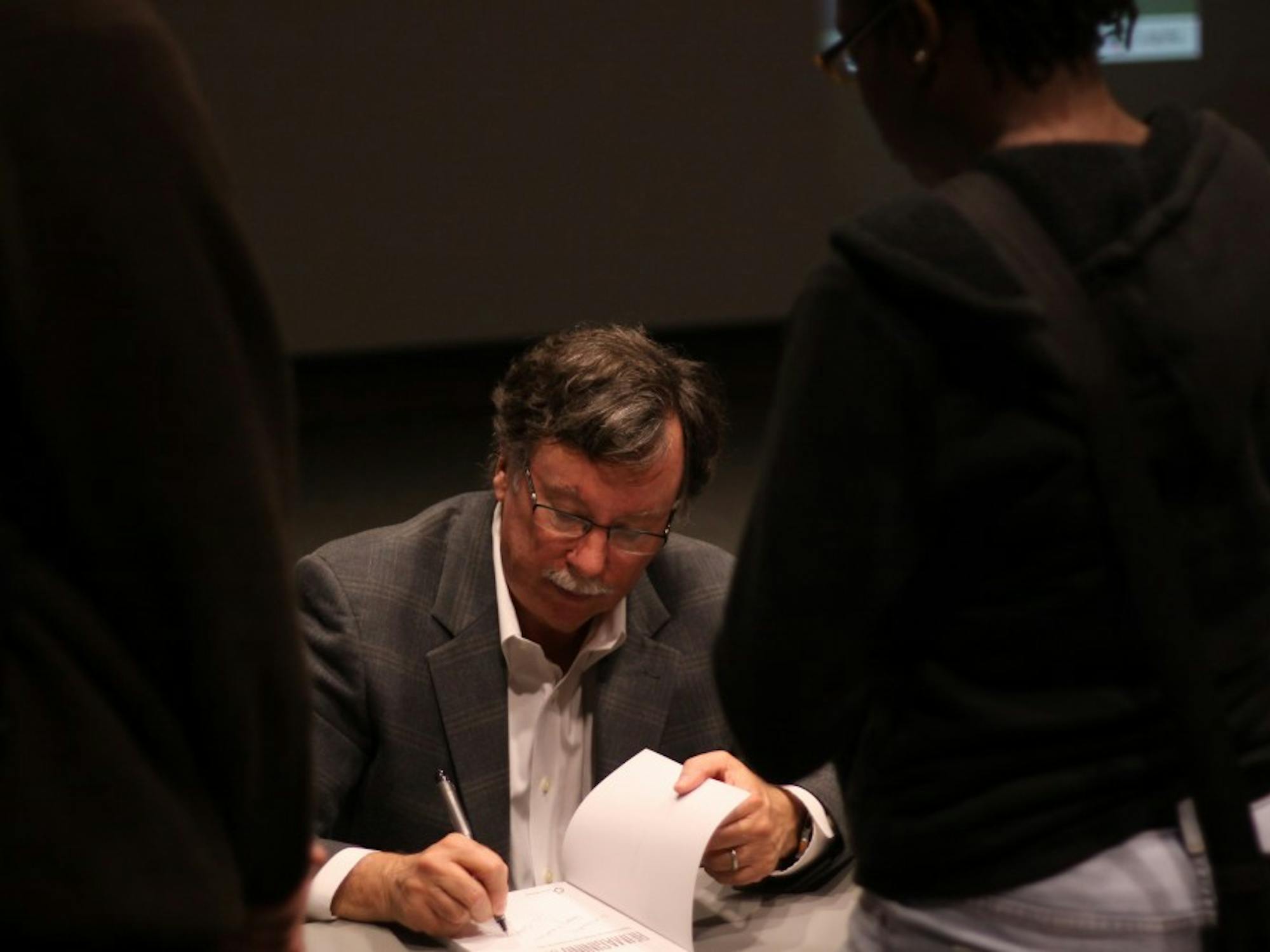On Tuesday in the Halle Library Auditorium, John Gallagher discussed and signed copies of his book “Reimagining Detroit” in which he addresses some of the most complicated issues facing Detroit and offers some ideas on what the city might become in the near future.
The event was sponsored by Eastern Michigan University’s department of political science and the department of geography and geology. John Gallagher has worked for The Detroit Free Press for more than two decades and specializes in urban and economic development.
Political science professor and department head Arnold Fleischmann was a major reason Gallagher came to discuss reimagining Detroit.
“[Gallagher is] really interesting in terms of alternative ideas,” Fleischmann said. “[The students] got a vision of what is going to be the future of Detroit.”
Detroit has held a negative reputation nationally and locally for awhile now. Forty miles of vacant land, burnt out homes, parking lots and vacant office buildings have helped to create this perception.
“Detroit is a very complex sense of issues,” Gallagher said. “A revitalized Detroit will be a vital center for the whole area and will help its surrounding areas [suburbs] reputation and property values. This is what makes Detroit unique, these big open chunks of land.”
Published in September by Wayne State University Press, “Reimagining Detroit” discusses ways Detroit can become greener and more entrepreneurial by offering many surprising ideas for what is currently, and might very soon be, done in the city of Detroit.
Gallagher’s presentation, which included a slideshow of photos taken by the long-time journalist, brought up many of these fascinating ideas.
“Urban agriculture…used for fresh local food and community building,” Gallagher stated as an idea currently being used for revitalizing the city.
Gallagher said creating bike lanes on the excess road lines not being used, using day lighting streams and digging back up streams once used for sewers were ideas Gallagher said will help return the city to being more “green and attractive.”
Senior Lindsay Benson, an urban planning major, said, “I didn’t know Detroit had so many small initiatives…it is nice to hear about these small initiatives.”
In an interview with Model D’s Dennis Archambault, Gallagher talked about his reason for writing this book.
“A new Detroit was emerging before our eyes – less dense, with big pockets of vacant land, and with our old automotive economy fading,” Gallagher said. “So I researched and wrote ‘Reimagining Detroit’ to get a whole lot of new and emerging ideas out there in the public’s hands in one readable format to promote a healthy debate on these matters.”
After presenting these emerging ideas, Gallagher held a forum with the attendees asking questions.
One audience member asked Gallagher, “How do you reinvent the perception of Detroit?”
Gallagher responded by mentioning that Turin, Italy revitalized itself after losing its automobile industry, and in 2006 it was rewarded with the Winter Olympics.
“Human population does not determine how great a city is,” Gallagher pointed out about the perception Detroit needs to regain its 2 million population in order to be revitalized. “Vancouver is often referred to as the best city to live in North America, and it has less people than Detroit.”
Gallagher offered up projects that have already begun building a greener and creative Detroit with Urban Farms in Mid-town, Heidelberg Project and Greenway.
“He gave a variety of perspectives, and his approach of dealing with problems incrementally provided them [students] a better understanding of Detroit,” remarked urban planning professor Norman Tyler, who was in attendance with his class.
Urban planning class attendee, senior Miguel Gordon, said, “I think the revitalized Detroit is not only important to me, but the state as a whole. Michigan needs Detroit.”
Retired EMU political science professor Charles Monsma said, “He had specific examples of things that are being implemented in the city.”
There was doubt about Detroit being able to reinvent itself with questions about its crime rate and public schools.
“These little projects help, however, I don’t know if they’re the answer,” said EMU senior Allen Squire.
“Detroit does need to have a plan, and does need changes,” Gordon said.
Gallagher offered up a message to EMU students, and one student in attendance who plans on going to Detroit to help with the new urban planning ventures.
“Hope they [students] get a sense of how complex the issues are … They can make a difference themselves,” Gallagher said. “Visiting downtown, shopping downtown, moving downtown and voting in favor of urban revitalization projects…these are avenues a student can help the city.”
“I want to get my first job in Detroit,” Lindsey Benson said. ”Even though I am originally from the UP, I kind of fell in love with Detroit because it has so much potential.”








